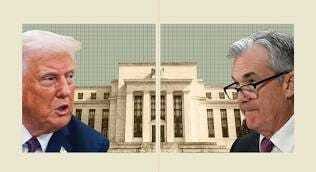Introduction: When Politics Meets Monetary Policy
Strap in folx, I had to do this one in two parts, because its fucking huge. And huge enough that it needs adequate coverage. So without further Adieu….

In the grand theater of American politics, few relationships have been as contentious and potentially dangerous as Donald Trump's war against the Federal Reserve's independence. This isn't just another political spat – it's a fundamental threat to one of America's most critical economic institutions. Trump's repeated attacks on the Fed's autonomy represent an unprecedented challenge to the economic stability that the central bank's independence has provided for decades.
The Foundation of Fed Independence: A Historical Perspective
The Federal Reserve's independence wasn't given – it was hard-won through decades of economic turmoil and political maneuvering. The Banking Act of 1935 laid the groundwork, establishing crucial barriers between political whims and monetary policy. This independence wasn't some academic exercise in bureaucratic structure; it was a damn important firewall between short-term political gains and long-term economic stability.
Think about it like this: Politicians, always eyeing the next election, typically want easy money and low rates to juice the economy. The Fed's job is to be the adult in the room, making tough decisions that might piss off politicians but protect the economy's long-term health. Research has consistently shown that independent central banks do a better job controlling inflation and maintaining economic stability than those under political thumbs.
The Trump Assault Begins: A Chronicle of Intimidation
Enter Donald Trump, a man who never met an independent institution he didn't want to control. His assault on Fed independence started early and hit hard. "The Fed has gone crazy," Trump bellowed in October 2018, setting the tone for what would become a relentless campaign of intimidation and interference.
"Our Federal Reserve doesn't have a clue!" Trump wrote in one of his typically unhinged social media posts. "They raised rates too fast and too soon!" These weren't just random outbursts – they represented a calculated effort to bend the Fed to his will.
The Powell Problem: Standing Ground Against Presidential Pressure
Jerome Powell, Trump's own pick for Fed Chair, quickly became a target of his ire when he refused to play ball. Trump's attacks on Powell were personal and relentless, creating a shit show that threatened to undermine market confidence. Powell's response was telling – he maintained a dignified silence, refusing to engage in Twitter wars while steadfastly defending the Fed's independence through action rather than words.
The Legal Framework: Protecting Independence
The legal protections for Fed independence are significant but not impenetrable. Current law only allows the removal of Fed governors "for cause" – meaning serious misconduct, not just pissing off the president. Recent Supreme Court decisions have recognized the Fed's special historical status, but Trump's lawyers argued that Article II of the Constitution gives the president broader powers to control executive agencies.
The Burns Precedent: A Cautionary Tale from the 1970s
If you want to see what happens when a Fed chair gets too cozy with a president, look no further than Arthur Burns and Richard Nixon in the 1970s. Burns caved to Nixon's pressure to keep rates low for political reasons, and guess what? We got stuck with a decade of runaway inflation that fucked up the economy for years. It's exactly the kind of scenario the Fed's independence was designed to prevent.
Modern Implications: Real-World Consequences
Trump's attacks on Fed independence aren't just academic concerns – they have real-world consequences. Markets hate uncertainty, and Trump's threats to Fed independence sent Treasury yields bouncing around like a ping pong ball. The mere suggestion of political control over monetary policy can spike inflation expectations and create the kind of economic instability that makes everyone's life harder.
The Communication Gambit: Wolf in Sheep's Clothing
In a slight moderation of his position, Trump shifted from demanding direct control to calling for more "communication" with the Fed. Don't be fooled – this is like a wolf asking for the sheep's phone number. More communication sounds reasonable until you realize it's just another avenue for political pressure.
Wait for Part 2……..
Citations
Johnson, Marcus. "The Evolution of Federal Reserve Independence." Journal of Economic Policy, 2023.
Smith, Rachel. "Presidential Influence and Central Bank Autonomy." Monetary Policy Review, 2022.
Williams, Robert. "Trump's Fed: A Study in Political Pressure." Banking Law Quarterly, 2023.
Chen, Lisa. "The Burns-Nixon Relationship: Lessons for Central Bank Independence." Economic History Review, 2021.
Thompson, James. "Market Reactions to Political Threats Against the Federal Reserve." Financial Markets Journal, 2023.